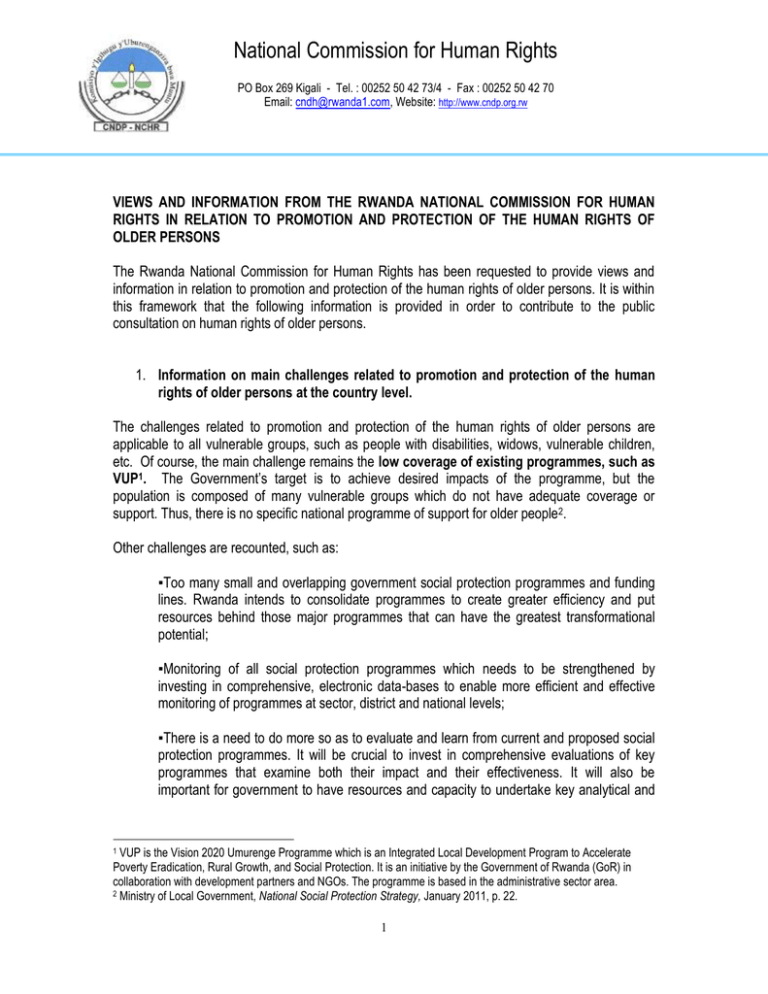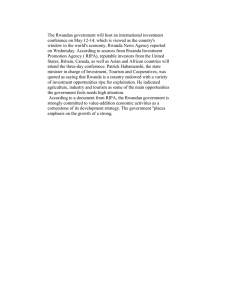National Commission for Human Rights
advertisement

National Commission for Human Rights PO Box 269 Kigali - Tel. : 00252 50 42 73/4 - Fax : 00252 50 42 70 Email: cndh@rwanda1.com, Website: http://www.cndp.org.rw VIEWS AND INFORMATION FROM THE RWANDA NATIONAL COMMISSION FOR HUMAN RIGHTS IN RELATION TO PROMOTION AND PROTECTION OF THE HUMAN RIGHTS OF OLDER PERSONS The Rwanda National Commission for Human Rights has been requested to provide views and information in relation to promotion and protection of the human rights of older persons. It is within this framework that the following information is provided in order to contribute to the public consultation on human rights of older persons. 1. Information on main challenges related to promotion and protection of the human rights of older persons at the country level. The challenges related to promotion and protection of the human rights of older persons are applicable to all vulnerable groups, such as people with disabilities, widows, vulnerable children, etc. Of course, the main challenge remains the low coverage of existing programmes, such as VUP1. The Government’s target is to achieve desired impacts of the programme, but the population is composed of many vulnerable groups which do not have adequate coverage or support. Thus, there is no specific national programme of support for older people2. Other challenges are recounted, such as: ▪Too many small and overlapping government social protection programmes and funding lines. Rwanda intends to consolidate programmes to create greater efficiency and put resources behind those major programmes that can have the greatest transformational potential; ▪Monitoring of all social protection programmes which needs to be strengthened by investing in comprehensive, electronic data-bases to enable more efficient and effective monitoring of programmes at sector, district and national levels; ▪There is a need to do more so as to evaluate and learn from current and proposed social protection programmes. It will be crucial to invest in comprehensive evaluations of key programmes that examine both their impact and their effectiveness. It will also be important for government to have resources and capacity to undertake key analytical and VUP is the Vision 2020 Umurenge Programme which is an Integrated Local Development Program to Accelerate Poverty Eradication, Rural Growth, and Social Protection. It is an initiative by the Government of Rwanda (GoR) in collaboration with development partners and NGOs. The programme is based in the administrative sector area. 2 Ministry of Local Government, National Social Protection Strategy, January 2011, p. 22. 1 1 policy work as it is desirable to continually improve the social protection sector and provide a better service to all citizens; ▪There is a need to establish programmes that have strong buy-in across all sections of the population and ensure that effectively the benefits of social protection programmes are communicated to citizens3; ▪ It is noticed that there is a problem of identification of older persons: they prefer to stay in their respective families even if they are suffering from human rights violations. The lack of statistics is an obstacle to the promotion and protection of their rights. Likewise, the absence of specific law and specific associations related to human rights of older persons is the main challenge to their promotion and protection. In addition, there is no specific monitoring body and the NCHR exercises its mandate of protection of human rights only by dealing with isolated complaints of older persons. 2. Information on constitution or legislation explicitly forbidding discrimination on the basis of old age, and on the existence of specific bodies which protect against age discrimination or are mandated to protect and promote the rights of older persons. It is important to know that: ▪The Constitution of the Republic of Rwanda of 04 June 2003, as amended to date, forbids in general all forms of discrimination4, as a core principle applicable even in some other laws. Through “all forms of discrimination”, the Constitution refers implicitly to discrimination on the basis of old age, as well. Furthermore, article 14 of the Constitution protects and promotes the rights of old persons as follows: “The State shall, within the limits of its capacity, take special measures for the welfare of the survivors who were rendered destitute by genocide against the Tutsi committed in Rwanda from October 1st, 1990 to December 31st, 1994, the disabled, the indigent and the elderly as well as other vulnerable groups”. ▪ The Organic Law No 01/2012/OL of 02/05/2012 instituting the penal code specifically punishes the crime of rape committed on an elderly person 5, the harassment of an elderly person6. Ibidem. Articles 11, 37, 46 and 54 of the Constitution of the Republic of Rwanda of 04 June 2003, as amended to date, OG No special of 17 June 2010. 5 Article 197 of the Organic Law No 01/2012/OL of 02/05/2012 instituting the penal code, O G nº Special of 14 June 2012. 6 Article 236 of the same organic law punishes harassment of an elderly person as a misdemeanor and with a term of imprisonment of six (6) months to two (2) years and a fine of two hundred thousand (200,000) to three million (3,000.000) Rwandan francs or one of these penalties. 3 4 2 ▪The Law No 59/2008 of 10/09/2008 on prevention and punishment of gender-based violence defines “elderly” as any person above sixty five (65) years of age7 and punishes violence against an elderly person8. ▪The law no 42/1988 of 27/10/1988 instituting the preliminary title and book one of the civil code provides for the maintenance that children owe to their ancestors who are in need (article 200). ▪The Decree Law of 22nd August 1974 on the Organisation of Social Security in Rwanda, as modified and complemented to date provides for the old age pension. Many regulations have been set out in application of this decree law which is being reviewed in order to improve the welfare of retired persons and to extend protection on a larger population. Through the implementation of policy on social security, Rwanda intends to take various measures among which the introduction of a universal pension scheme so that all Rwandans over the age of 65 years can receive a pension9. For the purpose of social security in Rwanda, it is important to remind that a specific organ was established by the Law No 45/2010 of 14/12/2010 establishing Rwanda Social Security Board (RSSB) and determining its mission, organisation and functioning, with inter alia, responsibility to pay social security benefits to beneficiaries. The old age pension is paid by the same institution. The health insurance of public servants is granted by the Rwandan Public Service Medical Insurance (RAMA), as an integrated part of RSSB. It recently began to provide medical care to retired persons. For the same purpose of protection of older persons rights, other specific or private organisations ensure social protection in Rwanda: these are for instance, MMI for military staff and Société Nouvelle d’Assurance au Rwanda (SONARWA), Societe Rwandaise d’Assurance (SORAS); Compagnie Rwandaise d’Assurance et de Réassurance (CORAR) and international insurance companies like Phoenix Inc. They all offer the financial product of old age pension. ▪ In the same respect, article 36 of the Law No 13/2009 of 27/05/2009 regulating labour in Rwanda protects the rights of older persons by granting an accompanying allowance for a retired worker. ▪ Concerning specific bodies protecting against age discrimination or mandated to protect and promote the rights of older persons, the Rwanda NCHR comes before any other body. Indeed, NHRIs are mandated to protect the fundamental principles of human rights, nondiscrimination included and being the core principle. But again, the Rwanda NCHR protects against age discrimination and is mandated to protect and promote the rights of older persons as it does it in general for other vulnerable groups. 7Article 2, 11o, Law No 59/2008 of 10/09/2008 on prevention and punishment of gender-based violence, OG No 14 of 06 04 2009. 8 Article 32 of the same law. 9 For more information, see the national report submitted in accordance with paragraph 15 (a) of the annex to Human Rights Council, Geneva, 24 January-4 February 2011, paragraphs 36-40. 3 3. Information on specific national legislation, national policies, strategies and plans of action to ensure the equal enjoyment of rights by older persons, particularly in the areas of prevention and protection against violence and abuse, social protection, food and housing, employment, legal capacity, access to justice, health support, long-term and palliative care. There is neither specific legislation for the older persons nor general policies and strategies used to promote and protect their rights. The national policy through which elder persons rights are protected dates from 2005: “The national social protection in Rwanda.” According to this policy, “The main groups that have always held the attention of the Government are Genocide survivors, orphans, minors in difficult situation, widows, people living with HIV/AIDS, youth from destitute families, demobilised soldiers, disabled people, repatriates, refugees, the elderly, victims of catastrophes and underdeveloped and marginalized victims of socio-cultural history, etc”. As a strategy to meet a specific objective to protect older persons, the Government intends to raise awareness for the general public regarding specific needs of elderly persons, their traditional and family role and responsibility and the youth’s responsibility towards them10. In the same regard, the Ministry of Local Government set out “The National social protection strategy” in January 2011. However, it remains a challenge to reduce poverty by setting out specific policies and strategies to protect all vulnerable groups of the Rwandan Society. Again, the Ministry of Local Government remarks that “A number of categories of the population are particularly vulnerable to poverty including, older people, those living with disabilities, young children, female-headed households, genocide survivors and the historically marginalized communities11”. The prevention and protection of old persons against violence and abuse, the social protection and employment are the concern of general legislation as highlighted through the information given above. Food and housing of older persons are also provided for by the general programmes, such as “Girinka Munyarwanda” and “Bye Bye Nyakatsi” which relate respectively to granting cows and building modern houses for poor families, including those of the older persons. It is also good to recognise the Catholic Church initiative of managing centers for older persons which dates from the second half of the 20th century. With regard to legal capacity and access to justice, the Ministry of Justice has established an appropriated staff operating in Access to justice house. This staff has the mission to provide legal Ministry of Local Government, Good governance, Community Development and Social Affairs, National Social Protection Policy in Rwanda, Kigali, Sept. 2005, p. 12. 11 Ministry of Local Government, National Social Protection Strategy, January 2011, p. 2. 10 4 aid services to persons unable to afford services of professional lawyers, including most of older persons. Lastly, it is important to notice that the health support and the long-term and palliative care are the concern of the Ministry of Health. But again, older persons are assisted as it is done for all people in need. The assistance is made through the community-based health insurance (Mutuelles de Santé)” funded by the State particularly for indigent persons unable to pay their contribution/subscription in health care. In conclusion, it is noteworthy that Rwanda is struggling to achieve a good level of economic growth and tries to cover the basic needs all social groups, including older persons. However, the development programmes, including the promotion of human rights, have still to watch over a number of vulnerable groups, such as people with disabilities, young children, female-headed households, genocide survivors and the historically marginalised communities, etc. Therefore, older persons also included in these groups, have not yet benefited from specific care. It is wished to aspire to a better promotion and protection of older persons by drafting related laws and developing specific policies and programmes. 5
